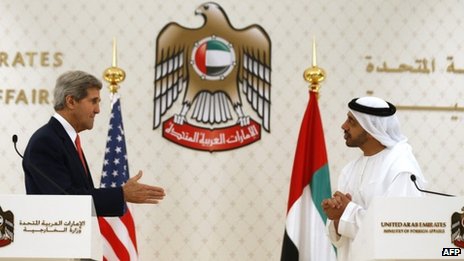 Negotiations in Geneva with Iran may have failed to produce an interim deal over the weekend, but Israel and Gulf countries are still alarmed about the potential for a nuclear deal with Tehran, finding themselves in the unusual position of being partners in angst.
Negotiations in Geneva with Iran may have failed to produce an interim deal over the weekend, but Israel and Gulf countries are still alarmed about the potential for a nuclear deal with Tehran, finding themselves in the unusual position of being partners in angst.The US Secretary of State John Kerry has just returned home from a 10-day trip to the Arab world and Israel with an unexpected escapade to Geneva for negotiations with Iran.
At every stop before and after the Geneva talks, Iran dominated the agenda.
Saudi Arabia has long been worried about a deal between its traditional protector and regional rival, mainly due to its own insecurities.
Surrounded by violent upheavals in a changing region, Israel's instincts have been to retrench and reject the idea of compromise with Iran.
An Iran deal could also make Mr Kerry's Mid-East peace efforts even more difficult. And while Iran is President Bashar al-Assad's key supporter, Mr Kerry told the BBC he "had no idea'' yet what the impact of an Iran deal would have on the conflict in Syria.
During a meeting in Jerusalem on Wednesday, Mr Kerry found himself ambushed in front of the cameras by the Israeli Prime Minister, Benjamin Netanyahu.
Mr Netanyahu launched into a diatribe about the Palestinians, accusing them of incitement and of creating artificial crises and he called on Mr Kerry to set them straight.
Mr Kerry sat stone-faced and then called on both sides to make compromises three months into an agreed nine-month timetable to reach a final settlement.
Criticism 'premature'
News of Mr Kerry's sudden plans to travel to Geneva to participate in the Iran negotiations broke overnight Thursday while he was in Amman. Mr Kerry was already scheduled to return to Tel Aviv on Friday morning for breakfast with Mr Netanyahu.
Perhaps to avoid another awkward public clash of views, the State Department did not plan for a photo opportunity ahead of the meeting. But Mr Netanyahu called the cameras to the airport to give his own statement shortly before Mr Kerry's arrival.
Livid, looking like he had not slept all night, the Israeli prime minister said the West was getting "a bad deal, a very, very bad deal'', while Iran was getting the ''deal of the century'' because "they got everything and paid nothing".
The White House said criticism was premature since there was no deal yet. A senior American official said Mr Netanyahu was being kept appraised of the details of negotiations and was not reacting to the specifics of a proposed agreement but rather to the idea of a deal in principle with Tehran.
Cliff Kupchan, an analyst with Eurasia Group in Washington, said Mr Netanyahu was trying to shape the negotiations because once a deal is struck, his influence over the course of events drops significantly.
"Not even conservative Israeli elites, possibly including Mr Netanyahu, really expect a deal that includes zero enrichment for Iran," said Mr Kupchan.
Mr Kerry has tried to convince Mr Netanyahu that a deal with Iran is good for Israel's security, as is peace with the Palestinians. But Mr Netanyahu's anger at the Iran negotiations means he will be even less eager on the peace talk front.
Most observers believe a final settlement with the Palestinians within nine months is very unlikely, so Mr Kupchan predicted that Mr Netanyahu would drag his feet some more without having to take political heat for ending the talks.
Gulf fears
In the Gulf too, monarchies are having a hard time coming to terms with the possibility of an Iran deal.
Mr Kerry spent a lot of time in Riyadh and then in the UAE, his last stop, reassuring officials and the public about the strength of Washington's relationship with its Gulf allies as well as Jordan, insisting that a deal with Iran would change nothing with regard to the US commitment to provide protection.
There is little that Gulf monarchies can do to torpedo the ongoing negotiations with Iran, but they will continue to hyperventilate in public about the prospects and lobby against them through other parties, like Congress.
Israel and the Gulf countries believe the US is naive and being duped by Iran.
"An agreement that contains and curtails Iran's nuclear programme is a net security gain for Saudi Arabia," said Emile Hokayem, a Gulf-based analyst for the International Institute for Strategic Studies.
''But the fear in Riyadh, however unfounded, is that it opens the door to an arrangement with the West that would subordinate Gulf interests to Iranian ones."
The enmity between Sunni Gulf monarchies and Shia Iran also plays out in Syria, where Iran has been actively supporting President Assad while Saudi Arabia and others have been backing the rebels.
But in an interview with the BBC, Mr Kerry said he had not discussed Syria with the Iranian Foreign Minister Mohammad Javad Zarif for more than 30 seconds.
"We are not having a geopolitical discussion right now," said Mr Kerry. "We are focused really intensely and exclusively on the nuclear programme."
But Mr Kerry acknowledged that Iran could make a very significant statement about its real intentions for the future if it "were to help find a solution" in Syria.
By BBC
The Iran Project is not responsible for the content of quoted articles.











